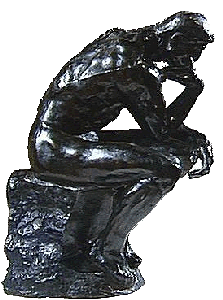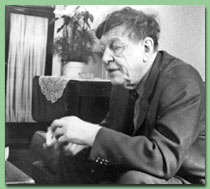|
Auden's Celebration of Home--Thanksgiving for a Habitat |
| Auden's Thanksgiving for a Habitat is a
collection of poems that celebrate the private and personal joys of our homes. Each
poem reflects on the way human beings exist and interact in such private spaces.
They are often deeply personal poems and are what Auden called some of his happiest and
most open work. As a result, their tone is often conversational, playful, even
cheeky. Through them, Auden reflects on significant portions of our daily lives, but ones
we are not perhaps prone to contemplate much--conversation, bathing, even (ahem) the
toilet. After Auden's prologue and a poem of thanksgiving, the remaining poems each
focus on a particular room of Auden's home, often using this as a base for wide-ranging
reflection on human nature and culture, as well as, at times, offering themselves as
intimations of God's eschatological purposes for creation. The later poems do have a
partiuclar trajectory-- from rooms that are tangential to the house (study, cellar, and
attic) to those that involve our physical lives (toilet, bath, and kitchen) to those that
involve our social lives (guest room, dining room, bedroom, and living room). Commentary I. Prologue: The Birth of Architecture: Human history (from "gallery-grave" to "trailer-camp") is but a blip on cosmic time; however, we tend to think even of the most recent history ("the Bicycle Age") as lengthy. The present generation must build its own architecture because we are something different than the animal world. Our builders (unlike bees, beavers, ants, etc.) are concerned with more than safety. We can ask the question of "if" about our deaths; thus, we build tombs.
II. Thanksgiving for a Habitat: None of us wants the pretense of a palace like William Randolph Hearst's (San Simeon) with its gaudy combinations or has the assumptions of an aristocratic lifestyle, even if we visit places like The Tump gallery or Vienna palace (Schönbrumn). (There aren't enough potential knights except the "half-strong" youth gangs.) However, our house is a kind of extended body, and we need a fair amount of space. Like the botanist Linnaeus, Auden is personally afraid of spiders, yet he chooses not to destroy their webs. As a human, he will outlast other species, probably wont be eaten, but he does expect to die someday of old age (unless the bomb gets us all first). Territory matters, and having a homestead with open land (a toft-and-croft) carries with it certain pleasures--such as choosing who will visit. III. The Cave of Meaning (The Poet's Study): Addressing the poet, scholar, and collaborator Louis MacNeice, Auden discusses his study before going to reflect on their shared memories and experiences. Both are men not born of any elite, have been given the gift of English, and have watched the changes that Hitler and Stalin brought to the West. It is better to be a modern poet with a small audience of readers who take you seriously, instead of an oral poet forced to wait on a baroque ruler. Auden would like to be a public poet with cultural concerns who "bear[s] witness/ to the Truth." Poetry has a certain kind of etiquette, and MacNeice is a kind of guardian spirit for Auden.
IV. Down There (Cellar): The cellar reminds us that the first human homes were caves designed to keep us safe from the cold. The cellar is a place to keep items from spoiling, a testing ground for little boys' courage, and a room that always "takes us as we are." V. Up There (Attic): On the other hand, an attic is an unnecessary space, a place we store what is easily forgotten. It seems insignificant, yet it is a place boys and girls escape to avoid angry parents or to dream. VI. The Geography of the House (Toilet): Everyone, from infant to aged, can enjoy the |
|
| toilet. Auden playfully argues that much has been accomplished there, suggesting that Rodin's The Thinker is appropriately positioned. He sees bowel movement behind the artistic process, at the root of any number of bad puns on the financial market, and offers a prayer to the "Global Mother," a kind of personification of the mother that potty trained each of us. Having to defecate reminds us not to think of ourselves too high. Likewise, Christian orthodoxy ought to be grateful for an era where fecal matter is kept out of view--its too persistent presence in earlier times gave ammunition to those, like the Manichees, who insisted that the flesh was corrupt. |  |
| VII. Encomium Balnei ("In
Praise of the Bathroom"): Auden explores the ironies of the hot bath--that the
English look to it as a source of health, that earlier eras were far dirtier, that the
Romans, with their huge, public baths would judge the modern bathtub as some expression of
the Christian cult ("some outlawed cult"). He jokes that it is a kind of
"carnal pleasure" accepted, and points out that the unwashed St. Anthony would
distrust it. . The modern bath's chief virtue is that it is a solitary activity, a kind of
Edenic place to sing to oneself and have a feeling of what is right restored each day. It
also, then, has a kind of utopian foreshadowing of perfect peace and meditation. (Thus,
one pilgrimage has ended in the city of God, the principles of the engineers/hoggers and
truckers/lumpers-both types of technique--have been surpassed by what the mystic Von Hugel
looked to--a perfect sense of God.) VIII. Grub First, Then Ethics (Kitchen): What would Plato's view of modernity be? Well, he would be amazed that so many of us read, that we use numbers the way we do, and that poets have become so obscure that they pull together references to Telford, a public works surveyor, John Muir, an American naturalist, and Vynian Board, the inventor of the electric harpoon. (Auden may be making fun of himself here.) But surely, he would be impressed with our modern, electric kitchens! Granted, unlike the "Age of Poise" with its servants, we have to cook for ourselves, but our kitchens far exceed the "prehistoric hearthstone" and the "abhorrent dungeon" of the past. Every creature that evolves to walk upright reveals its belly out front, and we all need food before we can do anything else. Cooking is surely Christian if you believe in the Eucharist. Likewise, gluttony and overeating are forgivable actions. The city of God is found in those not controlled by the state. Perhaps the kitchen offers us a vision of resistance, like the Greeks did at Thermopylae. IX. For Friends Only (Guest Room): The guest room stands empty most of the year waiting to entertain friends. The home in general offers friends certain things, including counsel. Friendship is a delicate, receptive balance, and the guest-room bed offers the blessing (the Felicissima notte, happiest night) of being wanted. X. To-Night at Seven-Thirty (Dining Room): Unlike other animals and all plants, only humans can give a feast and have being doing so since prehistory and will continue until the end of time. The best gathering is small, even though both Christ and Arthur seated more at a meal. Six is about the right size. Dinner parties have a certain etiquette, and those who violate it ruin it for everyone. Likewise, someone too perfect spoils it for the rest of it--brains aren't strictly needed. The perfect table is one that brings together various opposites--those who appreciate lavish fare yet also know that food is a kind of sacrament, an olam or unity of the cosmos in time. XI. The Cave of Nakedness (Bedroom):Exceptional sexual cases like that of Don Juan or Tristan and Isolde don't worry about beds, but the average person does. The passion of lovers and the ecstasy of monks aren't up for debate, but we do debate the meaning of our dreams. Auden disapproves of sitting rooms attached to bedrooms. He is an unwilling celibate when it comes to bed, but there are some advantages, most importantly, that of being left to one's common state. He needn't fear being taken in the night for political reasons. Pills help him sleep through, and he is pleasantly awakened by birds. Thankfulness to the Trinity, Mary, and Love is called for each time we wake in our reborn state.
XII. The Common Life (Living Room): The living room is a kind of "secular faith" with a "dogma" as to who or what we are. Auden prefers a kind of middle existence, neither too pretentious nor too trashy. A living room should neither be too big nor too small, and we are a generation that prefers to sit. Our books reveal much about us and what we desire. What brings us together and why we don't kill each other, are miracles. Here we are doing the most mundane of things with a room designed to keep the public, our natures, and Satan at bay. It is better for living together if love and the letter of formality predominate. Questions
|
|
